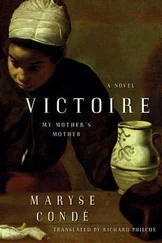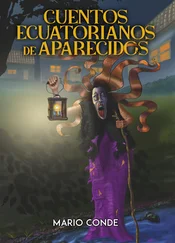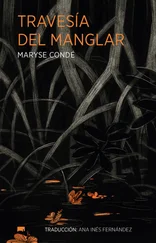One morning, to escape her inner self, she turned her back on Basse-Terre and set off for La Soufrière.
Three thousand feet up, the forest of Guadeloupe becomes stunted. Gone are the châtaigniers, the mastwoods, the mountain immortelles, and the red cedars. The earth is covered with a mass of purple-flowered, scentless bromeliads and white orchids streaked with cardinal-colored venules. Amarante, born and raised on the coast, just steps from the remorseless splendor of the ocean, discovered a landscape whose beauty is on a human scale. Here the sun can veil its face so as not to dazzle the newcomer, the sky clothe itself in gray, and the air grow soft with streaks of blue as cool as a mountain stream. Despite the advent of a new society following the abolition of slavery, a group of Wayanas clung stubbornly to the slopes of the volcano. Others had returned when they realized that nothing had changed down below. Down on the plain or high in the mountains, life always had the same bitter taste. The same bowl of misery was served wherever you were. To avoid being harassed by the gendarmes, the recalcitrant Wayanas had simply climbed higher and hid their wattle huts behind the camasey trees, whose leaves are embossed in greenish black. They slashed and burned plots of land. Then they cultivated whatever they needed to subsist— soukous yams that grow well high up, sweet potatoes, a little tobacco, and hemp, which the women wove like flax. If the leaf-cutter ants became too bothersome, they would abandon the plot and begin again farther up.
When Amarante loomed into sight at the end of the day, the yellow-and-white Creole dogs did not bark. On the contrary, they came and rubbed themselves up against her. After all she was still a Wayana for these years. Under the soap and rouge of the town, her skin had kept the smell of her people. According to Wayana hospitality, the guest is a gift from heaven. So no questions were asked. They gave her food and drink. When the night turned black, they hung a hammock for her on the veranda of the communal house. Amarante was delighted with this newly discovered monastic life, which her mother and father had experienced during their childhood and yearned for all their lives. She understood that happiness does not reside in a restless mind, as Celanire had taught her to believe. It resides in dispossession: wrapping oneself in a cloth dyed and woven by hand, washing oneself with the others in the icy waters of the gully, lighting a fire between four stones, cooking with the women, listening to stories under the lenient gaze of the moon. Only the insipid taste of the food bothered her, since for the Wayanas salt belonged to the gods and was not to be eaten by humans.
After a few weeks she became involved in communal activities. Although she hated scratching her hands planting, hoeing, and digging up sweet potatoes or yams, she took a liking to hunting. The Wayanas did not use firearms, coward’s weapons that kill from a distance. They hampered and fettered the animal with a lasso and fought with it close up, using a knife. When they finally got the better of their prey, they thanked the gods with a prayer and quartered the animal alive, then lay the chunks on a crisscross of young branches to cure them. Amarante also learned how to recognize each plant by its shape and its smell and began to read nature like an open book. All these activities purged her of her ill humor. She noticed that gradually she forgot the way she had been abandoned and betrayed, the love between Celanire and Elissa de Kerdoré, and all that nonsense that had caused her so much pain. She craved for a different way of thinking; she hungered for a new life.
One evening, in accordance with the Wayana tradition, a young man named Wole came and hung his hammock next to hers.
“No, I didn’t come here for that,” she sharply rebuked him. “I don’t want anybody. Men have shown me their limits and women their cruelty.”
Wole shrugged his shoulders.
“Don’t generalize! You speak of a man who made you suffer, for he was set in his heart on satisfying his ambition. As for the woman you were infatuated with, everyone knows she was a demon. Didn’t she kill our noble sister Ofusan?”
Amarante, who had often heard such nonsense, burst out laughing.
“I’d like you to explain how a baby can kill a grown-up.”
Wole’s expression turned serious.
“You Wayanas from the town, your minds have been completely distorted. You always need to have an explanation. You need logic and reason! Do you want me to tell you what happened?”
In spite of her expression of disbelief Amarante was dying to hear the story of Ofusan. Wole collected his thoughts.
“Noble sister Ofusan came into this world in the black of midnight. She was such a lovely little girl that all those who were present at her birth were overjoyed. Yet Gongolosoma, our protector and god who followed us from Africa, looked worried and predicted she would cause serious trouble for those she loved. This turned out to be true soon enough. All through her childhood and adolescence she was rebellious, pestering, and disrespectful of the elders. So nobody was surprised when at the age of sixteen she left the mountain to go down and marry a mulatto in the plain, a ladies’ man and womanizer with the airs of a patriot. When she left she broke two hearts — her mother’s and that of Agboyefo, to whom she had been predestined by the elders ever since she was a baby. Mothers’ hearts are always prepared to forgive. But not the betrothed’s. Outraged, Agboyefo went and asked Chéri Monplaisir, the dibia, who resided down at Saint-Sauveur, to help him take his revenge. ‘What do you want me to do?’ asked Chéri Monplaisir. ‘I want her to suffer like I’m suffering today. Invent for her the most terrible of punishments. Make an example out of her. It’s not just me and her mother she has insulted. She has offended the sacred traditions of the Wayanas. She has preferred the white man’s gods to ours.’ Chéri Monplaisir began by requesting a white heifer without a single blemish on its body and three hens of identical color as a sacrifice. When Agboyefo returned three days later, the dibia was overjoyed. ‘Things are looking good. I’ve made a deal with the superdemon Ogokpi. He’ll take care of Ofusan.’ Ogokpi is the master of the seven circles of hell. One day, he swallowed his daughters by mistake and gorged himself on their blood. Ever since, he has been asking for sacrifices of children and babies. The younger they are, the happier he is. He adores newborn babies. As promised, he took care of Ofusan. During the seven years of their marriage her mulatto husband cheated on her with all the bòbòs in Grande-Anse and thereabouts. As a rule women console themselves for their husbands’ philandering with a litter of kids. But her home was filled with nothing but hot air. In her solitude, then, she almost went mad. So she fell headfirst for the bait Ogokpi sent her: a little girl as radiant as the new moon. Anybody in her right senses would have been suspicious: a newborn discovered with her throat slashed at a crossroads! But no, not her! She blindly adopted the child and made her the queen of her house.
“Celanire has always testified that ever since she was a baby, it was her foster papa she loved, whereas she couldn’t stand the maman . Ofusan had the most magnificent baby clothes made for her. Nothing was too good for her. But every time Ofusan finished rubbing her with lotion and dressing her up, Celanire would deliberately vomit all over her baby smock. Staring her straight in the eyes, she would fart and defecate such a foul-smelling custard of caca that the whole house stank. Ofusan could not help but notice this aggressive attitude and complained to her husband. But all he had in response was a series of mollifying clichés, such as, ‘Everyone knows little girls always prefer their papa.’ Gradually Ofusan got tired of being neglected. She was still young and lovely; she could make a new life for herself. When Celanire heard her talk of leaving her husband and going back up the mountain, she first of all fell ill to stop her from going. One fever after another. Diarrhea after diarrhea. This only made Ofusan even more determined; she concluded that the air in Grande-Anse did not suit her little girl. Moreover, she worried a lot. Once some crazy woman had tried to steal the child. Ever since, she always kept close behind her whenever they strolled along the seafront, or else stood standing for hours in front of the house. So Celanire took drastic measures. She summoned her protector to rid her of her stepmother. Ogokpi, the superdemon, ran to her rescue, and changed into a dog. He adores this type of masquerade. It was when he turned himself into a dog and sank his teeth into his great rival Beelzebub, drawing blood, that he took over the reins of hell. It was in the very middle of the market he hurled himself onto Ofusan. We know the rest of the story.”
Читать дальше












